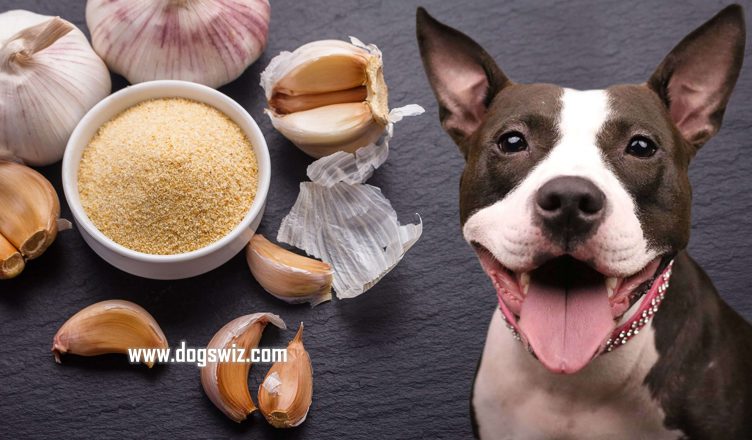Garlic salt is a popular compound of garlic and salt. Like its cousins, garlic powder and fresh garlic, it’s usually used for flavoring food such as stews and chili. The question is, can dogs eat garlic salt?
The answer to this question is not so straightforward. Some say it’s perfectly fine, others say it’s bad for the dog. We say they can eat it in small/moderate amounts, but it might be better to not feed them garlic product at all because of the risks associated with it. It seems that some dogs are unaffected by garlic, while others have severe reactions to it. The best idea for avoiding problems with your dog ingesting garlic salt is to consult with your vet before feeding your dog any foods that contain it.
Garlic is considered toxic to dogs because garlic belongs to the Allium plant family, which includes chives, leeks, shallots, scallions, and onions. These plants are notorious for containing thiosulfate, a toxic compound that can cause anemia in dogs. However, garlic salt is not necessarily toxic to dogs. Rather, the problem with garlic salt is that it can cause stomach upset or gastric distress in some canines. And, although not all dogs show this reaction, some canines can become extremely ill if they ingest garlic products.
Small amounts of garlic salt probably won’t cause any problems, but the same can’t be said about large amounts. Still, before you feed your dog garlic salt or any food that contains this ingredient, ask your vet first. Additionally, garlic isn’t the only thing to be wary about in garlic salt. The salt content is also significant. If your dog eats too much salt, he/she could have problems ranging from dehydration to blood pressure problems.
Check out: Can Dogs Eat Garlic?
Garlic Poisoning in Dogs
Despite the fact that symptoms of garlic toxicity differ from dog to dog, it is still a member of the Allium family, which means that it can cause severe problems for your dog. The best way to avoid giving your dog garlic is to eliminate all foods that contain it. If you do give your dog garlic by accident, consult with your vet immediately so he/she can determine if there are any other serious side effects or if there are other treatments available. Symptoms of garlic poisoning include:
- Vomiting
- Diarrhea
- Loss of appetite
- Abdominal pain
- Depression
- Dehydration
Additionally, if your dog ingests a large amount of garlic salt, he/she could develop hemolytic anemia. This is a condition that occurs when your dog’s body starts destroying the red blood cells faster than the stem cells can produce new ones. The result of this is a decrease in the body’s red blood cell count and a lack of oxygen to the brain and other organs.
Salt Poisoning in Dogs
Another reason to be wary of garlic salt is that it contains significant levels of salt. If your dog ingests too much salt, he/she could become very dehydrated. Additionally, high amounts of salt can cause problems with your dog’s blood pressure and can even lead to death. Signs and symptoms of salt poisoning include:
- Vomiting
- Diarrhea
- Lethargy
- Abnormal fluid accumulation within the body
- Excessive thirst or urination
- Tremors
- Seizures
- Coma
- Death
Always give your dog lots of water to drink after they eat a food product that contains salt. Ingesting too much salt can be very dangerous to your dog’s health, so it’s important to pay close attention to his/her symptoms and treat those symptoms as soon as they appear. If you suspect that your dog has ingested a large amount of salt, you should immediately contact your vet. Vets can usually treat the issue with intravenous fluids or medications to reduce the amount of salt in the dog’s body. As always, you should also be careful to avoid giving your dog any foods that contain high levels of salt.
“My Dog Ingested a Large Amount of Garlic Salt. What Should I Do?”
A small amount of garlic salt is perfectly fine for your dog to eat, but if he/she cleared a whole container of garlic salt or perhaps ate a food that contained large amounts of garlic salt, you should consult with your vet. Like any other food, excessive amounts of garlic salt can be very dangerous for your dog. You should also watch for signs of dehydration or other serious side effects.
After you get to the clinic, the vet might try inducing vomiting. This can help to get rid of the salt in your dog’s stomach. If this fails, the vet will probably give your dog intravenous fluids to replenish his/her body. And in case the dog is suffering from anemia, a blood transfusion might also be necessary. The dog may also have to remain hospitalized for a few days until blood values return to normal.
Conclusion
Your dog can eat garlic salt but only if provided in moderation. Too much garlic salt could prove fatal to the dog’s health and you should always consult with your vet before giving it to the dog. Dogs can eat garlic salt but we recommend you don’t feed them any garlic products at all. Additionally, you should always check the food’s label before you buy it. You don’t want your dog ingesting too much salt or garlic.
Thank you for reading the article.
Here are all of our garlic-related articles.
Have you ever included garlic salt in any of your pup’s food? What was his/her reaction? We would love to hear from you. Please share with our community in the comment section below.
